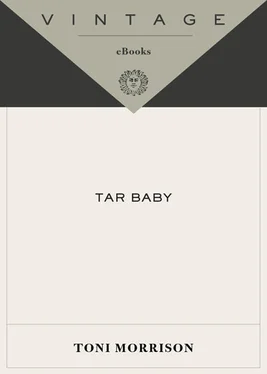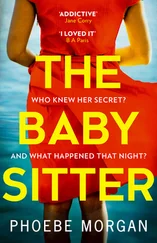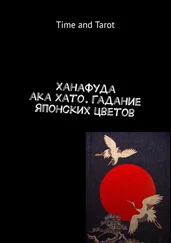Toni Morrison - Tar Baby
Здесь есть возможность читать онлайн «Toni Morrison - Tar Baby» весь текст электронной книги совершенно бесплатно (целиком полную версию без сокращений). В некоторых случаях можно слушать аудио, скачать через торрент в формате fb2 и присутствует краткое содержание. Жанр: Старинная литература, на русском языке. Описание произведения, (предисловие) а так же отзывы посетителей доступны на портале библиотеки ЛибКат.
- Название:Tar Baby
- Автор:
- Жанр:
- Год:неизвестен
- ISBN:нет данных
- Рейтинг книги:3 / 5. Голосов: 1
-
Избранное:Добавить в избранное
- Отзывы:
-
Ваша оценка:
- 60
- 1
- 2
- 3
- 4
- 5
Tar Baby: краткое содержание, описание и аннотация
Предлагаем к чтению аннотацию, описание, краткое содержание или предисловие (зависит от того, что написал сам автор книги «Tar Baby»). Если вы не нашли необходимую информацию о книге — напишите в комментариях, мы постараемся отыскать её.
Tar Baby — читать онлайн бесплатно полную книгу (весь текст) целиком
Ниже представлен текст книги, разбитый по страницам. Система сохранения места последней прочитанной страницы, позволяет с удобством читать онлайн бесплатно книгу «Tar Baby», без необходимости каждый раз заново искать на чём Вы остановились. Поставьте закладку, и сможете в любой момент перейти на страницу, на которой закончили чтение.
Интервал:
Закладка:
Under such benevolent circumstances, knowing she was intelligent and lucky, everything on her list would of course be there. And when the vision materialized in a yellow dress Jadine was not sure it was not all part of her list—an addition to the coconut and tamarind, a kind of plus to go with the limes and pimiento. Another piece of her luck. The vision itself was a woman much too tall. Under her long canary yellow dress Jadine knew there was too much hip, too much bust. The agency would laugh her out of the lobby, so why was she and everybody else in the store transfixed? The height? The skin like tar against the canary yellow dress? The woman walked down the aisle as though her many-colored sandals were pressing gold tracks on the floor. Two upside-down V ’s were scored into each of her cheeks, her hair was wrapped in a gelée as yellow as her dress. The people in the aisles watched her without embarrassment, with full glances instead of sly ones. She had no arm basket or cart. Just her many-colored sandals and her yellow robe. Jadine turned her cart around and went back down the aisle telling herself she wanted to reexamine the vegetables. The woman leaned into the dairy section and opened a carton from which she selected three eggs. Then she put her right elbow into the palm of her left hand and held the eggs aloft between earlobe and shoulder. She looked up then and they saw something in her eyes so powerful it had burnt away the eyelashes.
She strolled along the aisle, eggs on high, to the cashier, who tried to tell her that eggs were sold by the dozen or half-dozen—not one or two or three or four—but she had to look up into those eyes too beautiful for lashes to say it. She swallowed and was about to try again when the woman reached into the pocket of her yellow dress and put a ten-louis piece on the counter and walked away, away, gold tracking the floor and leaving them all behind. Left arm folded over her waist, right hand holding three chalk-white eggs in the air, and what will she do with her hands when she reaches the door? they wondered. Take her elbow out of the palm of her hand and push it open? Turn around and ask for a paper bag? Drop the eggs in a pocket? Each one of them begged in his heart that it would not happen. That she would float through the glass the way a vision should. She did of course and they needn’t have worried—the door always opened when you stepped on the mat before it, but they had forgotten that or had taken it for granted so long they had not really seen it until that woman approached it with the confidence of transcendent beauty and it flew open in silent obedience.
She would deny it now, but along with everybody else in the market, Jadine gasped. Just a little. Just a sudden intake of air. Just a quick snatch of breath before that woman’s woman—that mother/sister/she; that unphotographable beauty—took it all away.
Jadine followed her profile, then her back as she passed the store window—followed her all the way to the edge of the world where the plate glass stopped. And there, just there—a moment before the cataclysm when all loveliness and life and breath in the world was about to disappear—the woman turned her head sharply around to the left and looked right at Jadine. Turned those eyes too beautiful for eyelashes on Jadine and, with a small parting of her lips, shot an arrow of saliva between her teeth down to the pavement and the hearts below. Actually it didn’t matter. When you have fallen in love, rage is superfluous; insult impossible. You mumble “bitch,” but the hunger never moves, never closes. It is placed, open and always ready for another canary-yellow dress, other tar-black fingers holding three white eggs; or eyes whose force has burnt away their lashes.
Jadine’s luck continued. The dinner party was memorable and nowhere had anything begun to spoil. Like the arugula leaf, life was green and nicely curved. Nothing was limp. There were no tears or brown spots. The items on her shopping list were always there. The handsome raucous men wanted to marry, live with, support, fund and promote her. Smart and beautiful women wanted to be her friend, confidante, lover, neighbor, guest, playmate, host, servant, student or simply near. A lucky girl—why leave the show? cable to old relatives? write a cheery request-type, offer-type letter to a rich old pushover and split to Dominique on whatever Air France had to offer when everything on her shopping list was right there in Paris? Nothing was absent, not even the spit of an African woman whose eyes had burnt away their lashes.
Jadine slipped out of bed and went to the window. She knelt on the floor, and, folding her arms on the sill, rested her head on the pane. She lifted the back of her hand to her mouth and squeezed the soft flesh with her teeth. She couldn’t figure out why the woman’s insulting gesture had derailed her—shaken her out of proportion to incident. Why she had wanted that woman to like and respect her. It had certainly taken the zing out of the magazine cover as well as her degree. Beyond the window etched against the light of a blazing moon she could see the hills at the other side of the island where one hundred horsemen rode one hundred horses, so Valerian said. That was how the island got its name. He had pointed the three humps of hills out to her, but Margaret, who had accompanied them on the tour of the grounds when Jadine first arrived, said no such thing. One rider. Just one. Therefore Isle de le Chevalier. One French soldier on a horse, not a hundred. She’d gotten the story from a neighbor—the first family Valerian had sold to. Valerian stuck to his own story, which he preferred and felt was more accurate because he had heard it from Dr. Michelin, who lived in town and knew all about it. “They’re still there,” he said. “And you can see them if you go over there at night. But I don’t suppose we’ll ever meet. If they’ve been riding for as long as the story is old, they must be as tired as I am, and I don’t want to meet anybody older or more tired than I am.”
Maybe they’re not old, Jadine thought, staring out the window. Maybe they’re still young, still riding. One hundred men on one hundred horses. She tried to visualize them, wave after wave of chevaliers, but somehow that made her think of the woman in yellow who had run her out of Paris. She crawled back into bed and tried to fix the feeling that had troubled her.
The woman had made her feel lonely in a way. Lonely and inauthentic. Perhaps she was overreacting. The woman appeared simply at a time when she had a major decision to make: of the three raucous men, the one she most wanted to marry and who was desperate to marry her was exciting and smart and fun and sexy…so? I guess the person I want to marry is him, but I wonder if the person he wants to marry is me or a black girl? And if it isn’t me he wants, but any black girl who looks like me, talks and acts like me, what will happen when he finds out that I hate ear hoops, that I don’t have to straighten my hair, that Mingus puts me to sleep, that sometimes I want to get out of my skin and be only the person inside—not American—not black—just me? Suppose he sleeps with somebody else after we’re married? Will I feel the way I did when he took Nina Fong away for the weekend? He was amazed, he said, at my reaction. Weren’t we always to be honest with each other? He didn’t want a relationship with lies. Did I? And then we made up, set the date—no wedding, just a marriage—he got rid of his old mattress and bought a new one, a new one for us to grow old on, he said.
Then the magazine cover, and then her degree assured and then, the woman in yellow. And then she ran away because Ryk is white and the woman spit at her and she had to come to see her aunt and uncle to see what they would feel, think, say. White but European which was not as bad as white and American; they would understand that, or would they? Had they ever said? They liked her being in Paris, the schools she’d gone to, the friends she’d had there. They were always boasting about it. And it was not like she needed their views on anything. After her mother died they were her people—but she never lived with them except summers at Valerian’s house when she was very young. Less and then never, after college. They were family; they had gotten Valerian to pay her tuition while they sent her the rest, having no one else to spend it on. Nanadine and Sydney mattered a lot to her but what they thought did not. She had sought them out to touch bases, to sort out things before going ahead with, with, with anything. So far she had been playful with them, had not said anything definite about her plans. When they asked her was she serious about this Ryk fellow who telephoned and who sent letters every week, she pretended it was nothing. That she was thinking of going back to Paris only to get her things. There was a small assignment in New York; she would take it and then she wanted to see about opening a business of her own, she’d told them, a gallery, or a boutique or a…she’d looked at their faces then…well, something they could all do together so they could live together like a family at last. They smiled generously, but their eyes made her know they were happy to play store with her, but nothing would pull them away from the jobs they had had for thirty years or more.
Читать дальшеИнтервал:
Закладка:
Похожие книги на «Tar Baby»
Представляем Вашему вниманию похожие книги на «Tar Baby» списком для выбора. Мы отобрали схожую по названию и смыслу литературу в надежде предоставить читателям больше вариантов отыскать новые, интересные, ещё непрочитанные произведения.
Обсуждение, отзывы о книге «Tar Baby» и просто собственные мнения читателей. Оставьте ваши комментарии, напишите, что Вы думаете о произведении, его смысле или главных героях. Укажите что конкретно понравилось, а что нет, и почему Вы так считаете.











